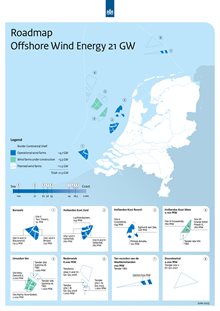Offshore wind energy
The Netherlands is working towards sustainable and affordable power that is available to everyone. The transition to energy from renewable sources is of great importance to our contribution, at national level, to the targets set out in the Paris Climate Agreement. In addition, the reduced availability of fossil fuels and the level of dependency on international power suppliers also means that there is demand for alternative sources of energy. The Dutch section of the North Sea has the potential to play a significant role in hitting the targets of the Climate Agreement and the transition to energy from renewable sources, not least with offshore wind energy.
Energy Accord
Agreement was reached in the 2013 Energy Accord for sustainable growth , stating that by 2023 offshore wind farms would have a total capacity of around 4.5 GW. Subsequently, in 2015, the Dutch Offshore Wind Energy Act(opent in nieuw venster) (verwijst naar een andere website) came into effect. This Act allows the government to allocate sites for the development of offshore wind farms.
The first road map for offshore wind farms (up to 2023) was used to allocate sites in the Borssele and Hollandse Kust (zuid) and Hollandse Kust (noord) wind farm zones. This roadmap has been completed – the three windfarms have been realized according to plan and now are operational.
Roadmap 21 gigawatt
In 2020, encouraged not least by the Netherlands, both the European Commission and the European Parliament stated the aim of reaching a reduction in CO2 emissions of 55 per cent by 2030 compared with 1990. It was considered that offshore wind energy would have an important role to play in that regard. For that reason the cabinet decided, in early 2022, to create a total capacity of approx. 21 GW of offshore wind energy by 2030 (adjusted later to 2033). That is to say, an extra capacity of 9.5 on top of the previously stated ambition of 11.5 GW.
The Climate Agreement had already stipulated that a possible additional challenge for offshore wind energy would be contingent on two important conditions:
- There is a demonstrable demand for energy from heavy industry near the coastline. Where energy demand is high it is not necessary to transport the energy further inland or to expand the high voltage network, which that would entail.
- Sufficient new wind farm zones have been designated
For more information see the letter from Minister Jetten of 10 June 2022 Additional Roadmap 2030 (Roadmap 21 gigawatts).

Download the Roadmap as pdf. (pdf, 795 kB)
Balancing of interests
When implementing the plans for large-scale roll-out of offshore wind energy, the government weighs up the different interests at sea and on shore as much as possible. Although it appears that there is ‘an ocean of space’ in the North Sea, practice shows that a lot of that space is already in use: there are busy shipping channels, many fisheries, and oil and gas are extracted; other than that, the Dutch Ministry of Defence has exercise areas, and there are nature areas and areas designated for sand extraction (both for commercial purposes and to bolster the coastline of the Netherlands). In some places, the sea is unsuitable for wind turbines, because it is too deep. In addition, a greater distance to the coast demands longer, more expensive cables and higher maintenance costs. So where offshore wind farms are ultimately located is a fairly exact science. A number of factors have to be taken into account, including affordability, energy yield and the effects on aspects such as nature, oil and gas extraction, the fishing industry, shipping and tourism.
Collaboration
The Dutch Ministries of Climate Policy and Green Growth, Infrastructure and Water Management, Agriculture, Fisheries, Food Security and Nature, and the Ministry of the Interior and Kingdom Relations are collaborating to hit the target in the Offshore Wind Energy programme. In order to realise the plans the wind energy sector, the stakeholders at sea, the coastal authorities and residents are all involved.